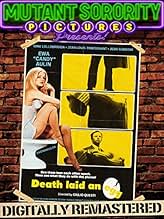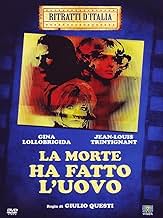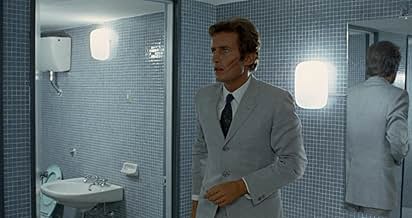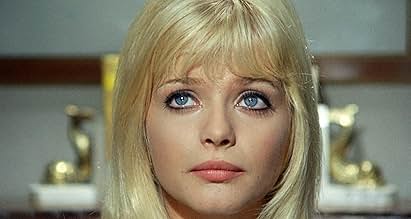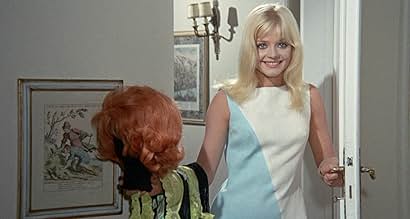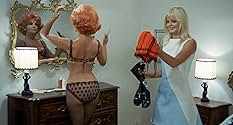IMDb RATING
5.8/10
1.9K
YOUR RATING
The depraved manager of a high-tech poultry factory is pulled into a love triangle with his domineering wife and her sexually-liberated cousin, leading to double-crosses and murder.The depraved manager of a high-tech poultry factory is pulled into a love triangle with his domineering wife and her sexually-liberated cousin, leading to double-crosses and murder.The depraved manager of a high-tech poultry factory is pulled into a love triangle with his domineering wife and her sexually-liberated cousin, leading to double-crosses and murder.
- Director
- Writers
- Stars
Jean-Louis Trintignant
- Marco
- (as Jean Louis Trintignant)
- Director
- Writers
- All cast & crew
- Production, box office & more at IMDbPro
Featured reviews
An avant-garde kind of giallo (more like a meta-reflection on the genre, really) that it's all over the place. Like a strange mix of Buñuel and Antonioni cinema with a documentary on acid of the poor conditions of a poultry factory, the plot was a little too convoluted to really keep my attention and I think the film tries too hard to be something different, without really achieving much. It's still an important title in this subgenre, but not for everyone.
I like how experimental some of these early gialli are. This is another movie about kind of spoiled rich people playing games with each other and getting into sordid trouble. Murder is involved, but not in the way you'd think after seeing the first half of the film, and I think that's one of the clever things about it. The story is more engaging than some, and, for once, actually more involving than set pieces, of which they are few (no prolonged stalking/murder sequences or anything like that).
Also, the movie is really funny at times, and I think it's absolutely intentional. The scene with the PR guy and all his "chicken poses" is priceless and like something you might find in a Monty Python sketch. I think there's some nice satire here of the rich industrial class, and a political subtext about automation and workers' rights. You see this sort of thing in vintage Italian genre films sometimes, and it's nice to see that sometimes, a thriller isn't just a thriller, if you know what I mean.
Finally, this is a slightly experimental film, with lots of fast edits and artistic scene transitions that often tell you things that aren't explicit in dialogue or scene itself. Also, the music -- I think it's great, in all its clanging and banging around and discordance, but it definitely won't be to everyon'e staste. A tip from my partner: "if you imagine a chicken playing the music, it becomes a thousand times better".
Also, the movie is really funny at times, and I think it's absolutely intentional. The scene with the PR guy and all his "chicken poses" is priceless and like something you might find in a Monty Python sketch. I think there's some nice satire here of the rich industrial class, and a political subtext about automation and workers' rights. You see this sort of thing in vintage Italian genre films sometimes, and it's nice to see that sometimes, a thriller isn't just a thriller, if you know what I mean.
Finally, this is a slightly experimental film, with lots of fast edits and artistic scene transitions that often tell you things that aren't explicit in dialogue or scene itself. Also, the music -- I think it's great, in all its clanging and banging around and discordance, but it definitely won't be to everyon'e staste. A tip from my partner: "if you imagine a chicken playing the music, it becomes a thousand times better".
Like many other European thrillers this early Italian giallo was obviously very influenced by the French film "Diabolique" with it's basic plot of a wealthy husband, wife, and mistress all scheming against each other. And like the later film "So Sweet, So Perverse" the movie throws another man (Jean Sorel)into the mix as a kind of a fourth side to the main triangle. This movie is no conventional thriller, however. For one thing it has kind of psychedelic, surrealist pop-art late 60's sensibility to it that always threatens to overwhelm (and occasionally does) the rational story-line. For another thing, it has a VERY bizarre setting, a fully-automated chicken plant. (There's a scene where the scientists at the plant create "monster" chickens without wings or beaks that really makes one want to swear off poultry for life). This unusual setting adds a whole industrial conspiracy angle and, moreover, a weird sort of social commentary to the proceedings.
The acting is all very good. Jean-Louis Tritigant plays a similar role to the one he'd later play in "So Sweet, So Perverse", but here he also might be a serial killer who is offing prostitutes in a roadside motel. Latin sex symbol Gina Lollabridga makes a rare appearance in this kind of film (which is actually much more entertaining than some of the bigger-budgeted movies she starred in)as the domineering wife. The young mistress is believably played by Ewa "Candy" Aulin, although she is not quite as enjoyable when she's not naked and not speaking in her natural (undubbed) heavy Swedish accent. (Aulin also appeared in another excellent, if even more obscure, giallo called "The Double"). The best thing about the movie though is the ending where EVERYBODY manages to get their just desserts--and then some. Definitely check this one out.
The acting is all very good. Jean-Louis Tritigant plays a similar role to the one he'd later play in "So Sweet, So Perverse", but here he also might be a serial killer who is offing prostitutes in a roadside motel. Latin sex symbol Gina Lollabridga makes a rare appearance in this kind of film (which is actually much more entertaining than some of the bigger-budgeted movies she starred in)as the domineering wife. The young mistress is believably played by Ewa "Candy" Aulin, although she is not quite as enjoyable when she's not naked and not speaking in her natural (undubbed) heavy Swedish accent. (Aulin also appeared in another excellent, if even more obscure, giallo called "The Double"). The best thing about the movie though is the ending where EVERYBODY manages to get their just desserts--and then some. Definitely check this one out.
Terms like "bizarre", "eccentric" and "convoluted" are often used too lightly in reviews for Italian gialli, but in case of "Death Laid an Egg" they are severe understatements! I'm not even sure this one qualifies as a giallo, because although the film got released before the genre properly started booming (in 1968), it's already experimenting with different plots and thinking out-of-the-box in terms of style and plot twists. Generally speaking, a giallo either handles about a masked psycho-killer with black gloves savagely butchering people - preferably pretty young models - with sharp objects, or it handles about a convoluted murder conspiracy complete with sexual intrigues, betrayal and triangular relationships. "Death Laid an Egg" primarily fits into the second category, but also somewhat in the first one, and then still even a lot more! The most intriguing aspect about the triangular relationship (between a man, his wife and her secretary) is that it takes place at the woman's family business; - a chicken far where insanely unethical experiments take place (headless/boneless poultry monstrosities will haunt your nightmares!). Furthermore, the man has a fetish for slicing up prostitutes, and the mistress may or may not have a secret agenda with a hunky marketing agent. One thing's for sure, though, all the loose ends form a compelling wholesome that keeps you gazing at the screen and - unlike many other similar films - everything nicely comes together in the end, and "Death Laid an Egg" does deliver in every department (mystery, suspense, flamboyance, ...)
Writer/director Giulio Questi was a very strange individual, to say the least. He seemingly doesn't care about traditional cinematic patterns or logical narrative structure, and many sequences/plot twists appear to be improvised on the spot. The opening credits, the soundtrack, and many camera perspectives are utterly weird! Questi also made the western-outcast "Se sei vivo spara", which is possibly the strangest Spaghetti Western ever, and the reputedly bonkers psychological horror/thriller "Arcana" (which I haven't seen yet).
Writer/director Giulio Questi was a very strange individual, to say the least. He seemingly doesn't care about traditional cinematic patterns or logical narrative structure, and many sequences/plot twists appear to be improvised on the spot. The opening credits, the soundtrack, and many camera perspectives are utterly weird! Questi also made the western-outcast "Se sei vivo spara", which is possibly the strangest Spaghetti Western ever, and the reputedly bonkers psychological horror/thriller "Arcana" (which I haven't seen yet).
Giulio Questi's early giallo is very different from the genre, but it can be called giallo since it has a mystery audience has no idea about until the very end. But the mystery doesn't involve the identity of the possible murderer but the various and altering relations between the characters. Marco, Anna and Gabrielle live together and work together, in a huge chicken farm / factory owned by Anna. Soon it is clear all three, plus their friends, have another things in their minds; they act what they don't say and vice versa. This gives the director Questi a great opportunity to handle topics of greed and money that easily blind.
The way how Questi handles his theme is very satiric, thus making the film close with Mario Bava's Reazione a catena / Bay of Blood 3 years later. Both films have serious theme about man's ability to turn violent in his search for monetary benefit and freedom and both films discuss this satirically, with maximal effect since comedy is often at its best when the subject stays serious and universally important. As a pure giallo mystery, the film is also quite rich since the audience has no idea what is going on until the very end when it is revealed. Questi uses very interesting editing technique that makes many of the scenes "broken", using flashbacks, dreamy/nightmarish moods and so on. This forces us to dive deeper inside the characters and their varying points of views.
The film has also an interesting topic about man's subconscious and instincts. Main character Marco is considered "morally corrupt" due to his unusual sexual preferences. But at the same time Questi shows how much there is inside human brain, needs, wills, desires, we don't necessarily want to talk about in fear of unacceptance or being classed as "sick." We are not as civilized, as perfect, as the moral codes of society try to suggest when they go after "the morally sick" Marco. There's also a very harrowing and unforgettably absurd scene at the experiment lab of the factory. The doctors have created a manipulated type of chicken that would be commercially extremely profitable to the factory while at the same time the manipulated monsters are a plentiful spitting at nature's face. Marco is against this, against the others around him while he has been named "morally wrong" and bad. Questi had important things and questions in mind and also the ability to turn them into a film.
Real themes in a giallo thriller are quite rare and Questi has done it very well. This is among the earliest but also among the very best of the giallo.
The way how Questi handles his theme is very satiric, thus making the film close with Mario Bava's Reazione a catena / Bay of Blood 3 years later. Both films have serious theme about man's ability to turn violent in his search for monetary benefit and freedom and both films discuss this satirically, with maximal effect since comedy is often at its best when the subject stays serious and universally important. As a pure giallo mystery, the film is also quite rich since the audience has no idea what is going on until the very end when it is revealed. Questi uses very interesting editing technique that makes many of the scenes "broken", using flashbacks, dreamy/nightmarish moods and so on. This forces us to dive deeper inside the characters and their varying points of views.
The film has also an interesting topic about man's subconscious and instincts. Main character Marco is considered "morally corrupt" due to his unusual sexual preferences. But at the same time Questi shows how much there is inside human brain, needs, wills, desires, we don't necessarily want to talk about in fear of unacceptance or being classed as "sick." We are not as civilized, as perfect, as the moral codes of society try to suggest when they go after "the morally sick" Marco. There's also a very harrowing and unforgettably absurd scene at the experiment lab of the factory. The doctors have created a manipulated type of chicken that would be commercially extremely profitable to the factory while at the same time the manipulated monsters are a plentiful spitting at nature's face. Marco is against this, against the others around him while he has been named "morally wrong" and bad. Questi had important things and questions in mind and also the ability to turn them into a film.
Real themes in a giallo thriller are quite rare and Questi has done it very well. This is among the earliest but also among the very best of the giallo.
Did you know
- GoofsIn the first slasher scene, the knife blade doesn't show any blood till after 7 slashes.
- ConnectionsFeatured in Ultimate Poliziotteschi Trailer Shoot-Out (2017)
- How long is Death Laid an Egg?Powered by Alexa
- can someone at IMDB look at photos 4 5 6 7 8 and tell me what film they are from? they are not death laid an egg
Details
Contribute to this page
Suggest an edit or add missing content

Top Gap
By what name was La mort a pondu un oeuf (1968) officially released in India in English?
Answer

